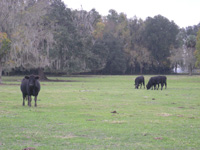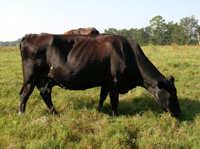Pest and Pesticide Use Survey of Florida Beef and Dairy Cattle Producers
Project description and objectives:
Florida’s beef cow industry ranks 11th nationally, with approximately 1,000,000 head in 18,000 herds, while the milking and replacement dairy herd size is 180,000 animals. A producer survey to determine the most important pests of beef and dairy cattle in Florida was conducted through exceptional stakeholder support groups including county-based faculty and beef and dairy cattle organizations.
Project activities:
Producers were questioned for their views on the importance of all pests of cattle, their perceived views of pesticide resistance, their pesticide use patterns and the  areas in which they are in need of additional support. The survey was modeled on those previously utilized by veterinary entomology programs elsewhere. The survey tool was enhanced through the assistance of the Florida Survey Research Program who also collected the data. Implementation was accomplished with the aid of several county-based faculty and stakeholder participants who served as Co-PI’s.
areas in which they are in need of additional support. The survey was modeled on those previously utilized by veterinary entomology programs elsewhere. The survey tool was enhanced through the assistance of the Florida Survey Research Program who also collected the data. Implementation was accomplished with the aid of several county-based faculty and stakeholder participants who served as Co-PI’s.
Leadership in targeted counties was identified and additional partners were included to expand the effort. The survey was disseminated to producers principally through county-based faculty by way of inclusion in their newsletters, or at their outreach meetings. Over 1,800 surveys were distributed to county faculty in 15 FL counties, at the Florida Cattlemen’s Association’s annual meeting (Marko Island) and at the Beef Forage Field Day held at the North Florida REC in Marianna.
Project accomplishments:
We had planned to develop a web-based tool for on-line sampling of Florida’s cattle producers. However, this method of survey dissemination was not accomplished.
Despite the widespread distribution of surveys, very few were returned.  Responses were only obtained from beef cattle producers with operation sizes from 10 animals to 1,000 animals. Most producers (58%) applied pesticides once per season for flies on pastured animals. Approximately 78% of producers treated for cattle grubs and 70% treated for lice.
Responses were only obtained from beef cattle producers with operation sizes from 10 animals to 1,000 animals. Most producers (58%) applied pesticides once per season for flies on pastured animals. Approximately 78% of producers treated for cattle grubs and 70% treated for lice.
Producers identified flies on pastured animals and fire ants (principally damaging equipment) as their major pests. Animal sprays and pour-ons were the most commonly used methods of insecticide application. Producers reported spending up to $2,000 per year to manage fly pests, with 70% of producers spending between $500 and $1,000 per year.
Producers cited pest presence and animal discomfort as the criteria for pesticide application. Manure management was the most commonly reported pest management technique (>62% of respondents). No producers utilized biological control (none are available for pastured animal pest management). Producers obtained their pesticide recommendations from Cooperative Extension (>63%) and other farmer and veterinarians (each, 54%). Permethrin-containing products were most frequently used, as were dewormer-fly control products, such as the avermectins. Other pesticide classes utilized were organophosphates, insect growth regulators and other microbials (abamectin and spinosad).
Over 83% of respondents own a computer, 75% of these use the Internet and of these, 89% use UF/IFAS web sites to obtain information for their cattle operations.
Using the information from this survey, we have determined that our IFAS online documents are reaching our stakeholders. Furthermore, through the results of this survey, producers have indicated that they are in need of additional pest management tools for pasture flies. However, producers continue to treat for cattle grubs, a pest that is probably not as common as is believed.
Project leaders:
Dr. Phillip Kaufman, Assistant Professor, Entomology and Nematology, UF
Cynthia Sanders, Extension Agent I, Alachua County Extension
Pat Hogue, Extension Agent III, Okeechobee County Extension
Doug Mayo, Extension Agent II, Jackson County Extension
Jim Handley, Executive Director, Florida Cattlemen’s Association